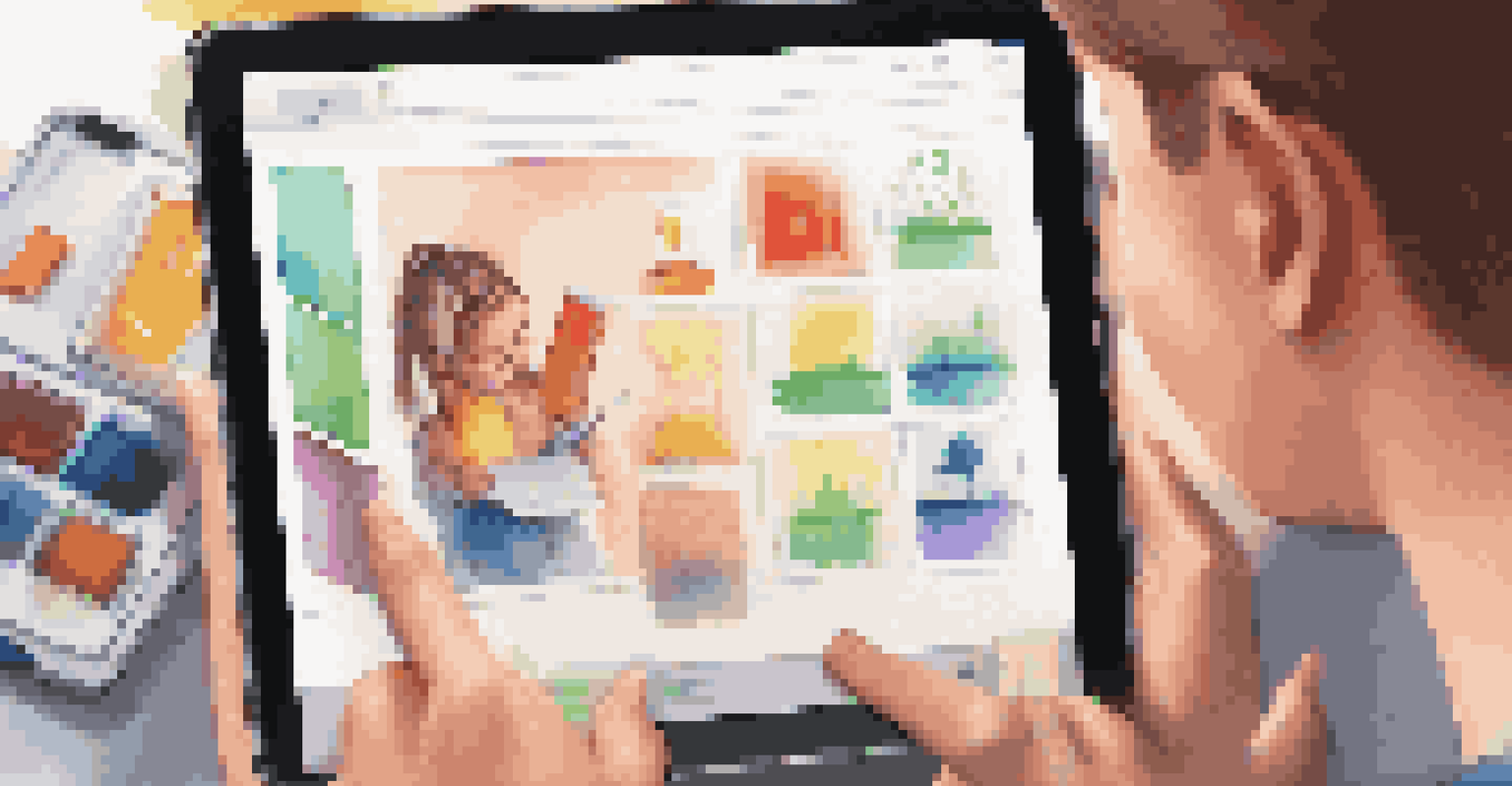Navigating Digital Learning: The Evolving Role of Educators

The Shift to Digital Learning in Education
Digital learning has transformed traditional classrooms into dynamic online environments. With tools like video conferencing and interactive platforms, educators can reach students anywhere in the world. This shift was accelerated by the COVID-19 pandemic, which required immediate adaptation to remote learning. As a result, both teachers and students have had to embrace new technologies rapidly.
Technology will not replace teachers, but teachers who use technology will replace those who don't.
The integration of technology in education isn't just about convenience; it's about enhancing the learning experience. Digital tools have opened up a wealth of resources, allowing educators to create more engaging and personalized content. For instance, virtual simulations can offer students hands-on experiences that may not be feasible in a physical classroom.
Despite the benefits, this transition has also presented challenges. Many educators had to quickly learn how to use new platforms effectively while ensuring their students remained engaged. This evolving landscape has pushed teachers to become lifelong learners themselves, adapting their skills to meet the needs of modern education.
Redefining the Educator's Role in Digital Spaces
In a digital learning environment, the role of educators has shifted from being the primary source of knowledge to facilitators of learning. Teachers now guide students as they navigate resources and collaborate with peers online. This change encourages students to take more ownership of their learning, fostering critical thinking and problem-solving skills.

Moreover, educators are now tasked with creating inclusive and supportive online environments. This involves being responsive to diverse learning styles and addressing the unique challenges students face in a digital context. For example, teachers might use breakout rooms during virtual classes to allow for smaller group discussions, catering to different needs.
Digital Learning Transforms Education
The shift to digital learning has revolutionized traditional classrooms, enabling educators to engage students globally through innovative technologies.
The role of the educator also extends to mentoring and supporting students' social-emotional well-being. In a virtual setting, it’s crucial for teachers to maintain connections and provide encouragement, helping students feel valued and understood. This holistic approach to education is essential in fostering resilience and adaptability in learners.
Embracing Technology: Tools for Educators
Today's educators have access to an array of digital tools that enhance the learning experience. Platforms like Google Classroom, Zoom, and various educational apps allow for seamless communication and resource sharing. These tools not only streamline administrative tasks but also facilitate collaborative projects among students.
The art of teaching is the art of assisting discovery.
Interactive tools, such as Kahoot! and Nearpod, transform lessons into engaging experiences through gamification and real-time feedback. This approach can boost student motivation and make learning more enjoyable. For instance, using quizzes or polls during a lesson can help teachers gauge understanding and adapt their teaching accordingly.
However, it’s important for educators to choose the right tools thoughtfully. Not every platform will suit every lesson or learning objective. Educators should consider the specific needs of their students and the goals of their curriculum when selecting digital resources, ensuring that technology enhances rather than detracts from the learning experience.
The Importance of Professional Development
As digital learning becomes more prevalent, ongoing professional development for educators is crucial. Workshops, webinars, and online courses can help teachers stay updated on the latest technologies and pedagogical strategies. Engaging in professional development not only builds skills but also fosters a sense of community among educators.
Many schools and districts are prioritizing training in digital tools and effective online teaching methods. This support is essential for helping educators feel confident in their abilities to lead virtual classrooms. Collaborating with peers can also provide valuable insights and shared experiences, enriching the learning environment for both teachers and students.
Educators as Learning Facilitators
In digital spaces, teachers have transitioned from knowledge providers to facilitators, guiding students in their learning journey and fostering critical thinking.
Furthermore, professional development should focus on the integration of technology with pedagogy. Educators need to understand not just how to use a tool, but how it can effectively support their teaching goals. By blending technology with traditional teaching practices, educators can create a more holistic and impactful learning experience.
Fostering Student Engagement in Digital Learning
Engagement is a key component of effective learning, especially in a digital environment where distractions abound. Educators are employing various strategies to keep students actively involved. From interactive polls to group projects using digital platforms, teachers are finding innovative ways to make learning dynamic.
A sense of community can also significantly enhance engagement. By creating virtual spaces for students to connect, such as discussion forums or social media groups, educators can foster relationships that contribute to a positive learning atmosphere. This connection is vital, as students often feel isolated in remote learning settings.
Additionally, providing choices in assignments can empower students and increase their motivation to participate. Allowing them to select project topics or the format of their presentations can lead to deeper investment in their work. When students have a say in their learning, they are more likely to engage meaningfully with the material.
Assessing Learning in a Digital Landscape
Assessing student learning in a digital world poses unique challenges and opportunities. Traditional methods of assessment may not always translate well to an online format. As a result, educators are exploring alternative assessment strategies, such as project-based learning and digital portfolios.
Formative assessments, like online quizzes and interactive discussions, allow teachers to monitor student progress in real time. These assessments can provide immediate feedback, helping students understand their strengths and areas for improvement. This ongoing assessment approach encourages a growth mindset and supports continuous learning.
Ongoing Professional Development Essential
Continuous professional development for educators is crucial to keep pace with evolving technologies and pedagogical strategies in digital learning.
Moreover, incorporating self-assessment and peer feedback can foster a sense of accountability among students. When learners reflect on their own work and evaluate their peers, they deepen their understanding of the material. By shifting the focus from grades to learning outcomes, educators can create a more meaningful assessment experience.
Looking Ahead: The Future of Education
The future of education is undoubtedly intertwined with technology, and educators will continue to play a pivotal role. As digital learning evolves, teachers must remain adaptable, continuously updating their skills and strategies. This adaptability will be key to meeting the diverse needs of future learners.
Emerging technologies, such as artificial intelligence and virtual reality, have the potential to reshape educational experiences further. Educators will need to explore how these tools can be integrated into their teaching practices effectively. By staying informed and open to innovation, teachers can enhance the learning experience in ways we can only begin to imagine.

Ultimately, the core mission of education remains unchanged: to empower students to think critically, collaborate effectively, and become lifelong learners. As educators navigate this digital landscape, their commitment to fostering these skills will prepare students for success in an ever-changing world.